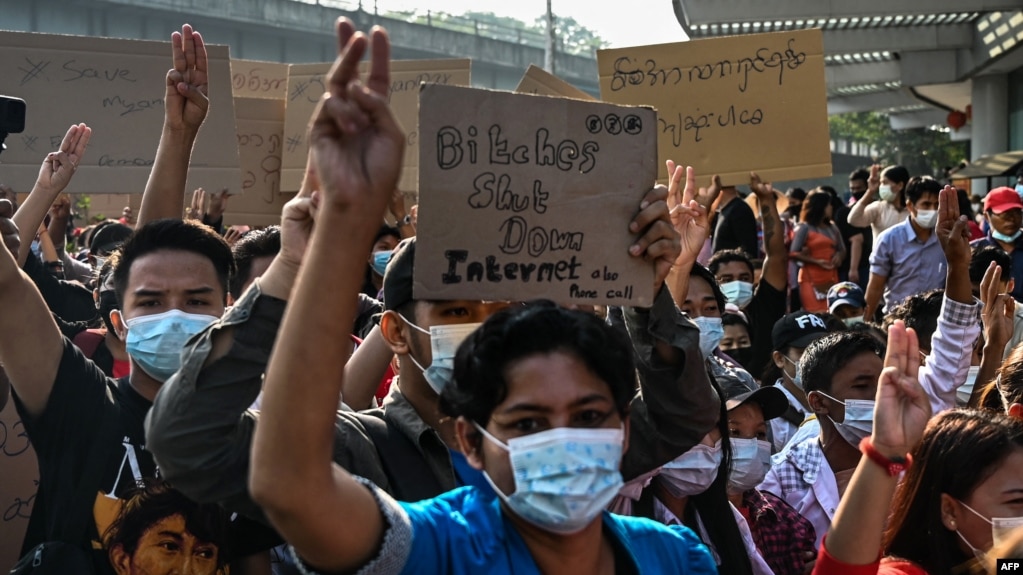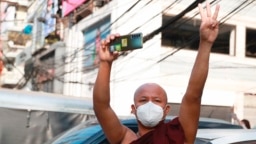January 03, 2025
By VOA Burmese

Protesters hold up the three-finger salute and placards denouncing the move to shut down internet access during a demonstration against the military coup in Yangon
on Feb. 7, 2021.
WASHINGTON —
Myanmar's military leaders have enacted a new cybersecurity law that analysts say will provide the junta with extensive control over access to information.
The expansive law — which has 16 chapters and 88 articles — includes regulations on Virtual Private Networks, or VPNs, which allow internet users to circumvent website blocks. It penalizes users who access or share media articles and information from banned websites.
The military council has said that the law is needed to protect against cyberattacks and cybercrimes that could threaten the country's stability. Among the regulations is a ban on the creation of illegal online gambling sites, which have been linked to organized crime.
But an expert with the digital rights group Myanmar Internet Project, who asked to be identified only as U Han, said the law is more focused on suppressing rights than protecting the public.
"All the provisions of the law are designed to suppress rather than protect the public," Han told VOA Burmese. "We believe that junta will use this bill as a weapon prepared for this purpose."
The law will harm "cyber freedom, digital freedom, and the right to use the internet, which are among the most fundamental of our human rights," said Han.

WASHINGTON —
Myanmar's military leaders have enacted a new cybersecurity law that analysts say will provide the junta with extensive control over access to information.
The expansive law — which has 16 chapters and 88 articles — includes regulations on Virtual Private Networks, or VPNs, which allow internet users to circumvent website blocks. It penalizes users who access or share media articles and information from banned websites.
The military council has said that the law is needed to protect against cyberattacks and cybercrimes that could threaten the country's stability. Among the regulations is a ban on the creation of illegal online gambling sites, which have been linked to organized crime.
But an expert with the digital rights group Myanmar Internet Project, who asked to be identified only as U Han, said the law is more focused on suppressing rights than protecting the public.
"All the provisions of the law are designed to suppress rather than protect the public," Han told VOA Burmese. "We believe that junta will use this bill as a weapon prepared for this purpose."
The law will harm "cyber freedom, digital freedom, and the right to use the internet, which are among the most fundamental of our human rights," said Han.

Myanmar youths browse their social media pages at an internet shop in Yangon, Dec. 18, 2018.
By suppressing these rights, Myanmar "will be violating other basic human rights, socio-economic rights, such as education, business rights and religious rights," he said.
The law includes penalties for noncompliance, including warnings, fines and suspensions. It has the power to blacklist digital platform service providers who fail to prevent, remove or cease circulation of content deemed by the junta as "disinformation" or "rumors" that could damage unity or stability.
Digital platform service providers are now required to collect the names and data of their users for up to three years, and to disclose those details to the authorities.
The law additionally includes penalties for anyone found to have read, stored or shared articles from media outlets or groups banned or labeled as terrorists by the military council; gives the authorities power to shutter online services for reasons of security of the "public good"; and allows for action to be taken against Myanmar citizens outside of the country's borders.
One of the biggest criticisms from digital rights experts is the regulations around VPN use.
Since the junta seized power in a military coup in February 2021, it has sought to control the flow of information. Dozens of journalists have been detained, broadcasting licenses revoked and websites blocked.
Because of that, many residents use VPNs to access social media and media websites, or even to study.
But under the new law, those users could face up to six months in prison and fines for using banned VPN services.
A lawyer based in one of Myanmar's largest cities said the new law will make it harder for the public to access information.
The lawyer, who asked not to be identified for security reasons, said that after thoroughly reading the full law, he sees no clear and concise provision.
"It seems that it has been written to be used as needed and that it has been written with the primary focus on those who will use [a] cyber platform," the lawyer said.
Myanmar in May of last year expanded blocks on websites, digital platforms and VPNs. According to Freedom House, the action specifically limited users to being able to access only about 1,500 preapproved websites.
"Internet freedom in Myanmar consequently declined, leaving it tied with China as the worst-surveyed country," Freedom House said in November.
Citing leaked documents, the activist group Justice for Myanmar reported in June that the enhanced censorship system uses technology from a Chinese network security company to block VPNs.
By suppressing these rights, Myanmar "will be violating other basic human rights, socio-economic rights, such as education, business rights and religious rights," he said.
The law includes penalties for noncompliance, including warnings, fines and suspensions. It has the power to blacklist digital platform service providers who fail to prevent, remove or cease circulation of content deemed by the junta as "disinformation" or "rumors" that could damage unity or stability.
Digital platform service providers are now required to collect the names and data of their users for up to three years, and to disclose those details to the authorities.
The law additionally includes penalties for anyone found to have read, stored or shared articles from media outlets or groups banned or labeled as terrorists by the military council; gives the authorities power to shutter online services for reasons of security of the "public good"; and allows for action to be taken against Myanmar citizens outside of the country's borders.
One of the biggest criticisms from digital rights experts is the regulations around VPN use.
Since the junta seized power in a military coup in February 2021, it has sought to control the flow of information. Dozens of journalists have been detained, broadcasting licenses revoked and websites blocked.
Because of that, many residents use VPNs to access social media and media websites, or even to study.
But under the new law, those users could face up to six months in prison and fines for using banned VPN services.
A lawyer based in one of Myanmar's largest cities said the new law will make it harder for the public to access information.
The lawyer, who asked not to be identified for security reasons, said that after thoroughly reading the full law, he sees no clear and concise provision.
"It seems that it has been written to be used as needed and that it has been written with the primary focus on those who will use [a] cyber platform," the lawyer said.
Myanmar in May of last year expanded blocks on websites, digital platforms and VPNs. According to Freedom House, the action specifically limited users to being able to access only about 1,500 preapproved websites.
"Internet freedom in Myanmar consequently declined, leaving it tied with China as the worst-surveyed country," Freedom House said in November.
Citing leaked documents, the activist group Justice for Myanmar reported in June that the enhanced censorship system uses technology from a Chinese network security company to block VPNs.

Myanmar junta's VPN block poses 'major threat,' say analysts
The technology allows authorities to create a list of all known VPN domains and IP addresses they want blocked.
"Instead of just attacking the media, which they've done until now, [the junta are] actually attacking the ways that the general public can communicate and can access information," Oliver Spencer, an expert on free expression in Myanmar, told VOA last year.
Myanmar scores poorly on world rankings for digital rights and media freedom. Freedom House lists it as "not free" for both global and internet freedoms, and the country ranks 171 out of 180, where 1 shows the best environment, on the World Press Freedom Index.
Some information in this report came from The Associated Press.

No comments:
Post a Comment